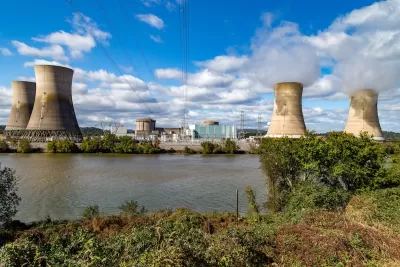The proposal to restart one unit of the infamous plant, which suffered a partial meltdown in 1979, still requires federal, state, and local approvals.

A proposal from Constellation Energy and Microsoft to restart a unit of the Three Mile Island nuclear power plant faces a series of regulatory hurdles before the project could become a reality.
According to a Reuters article, Unit 1 of the plant was retired in 2019 for financial reasons. “Constellation plans to spend about $1.6 billion to revive the plant, which it expects to come online by 2028.” Last year, nuclear plants produced almost one-fifth of total U.S. electricity.
“A relaunch of Three Mile Island, which had a separate unit suffer a partial-meltdown in 1979 in one of the biggest industrial accidents in the country's history, still requires federal, state and local approvals,” the article notes. Constellation has not yet filed an application to restart the plant, but a deal with Microsoft signals momentum.
Tech companies are eyeing nuclear energy as one way to meet the rapidly growing demand for energy for data centers and artificial technology applications. Under its deal with Constellation, Microsoft will buy power from the Three Mile Island plant for 20 years. Microsoft also recently signed a similar deal with Washington-based fusion company Helion, while a deal between Amazon and Talen Energy is being challenged by a group of utilities who allege that the deal could reduce the reliability of the grid or raise costs for consumers.
FULL STORY: Microsoft deal propels Three Mile Island restart, with key permits still needed

Trump Administration Could Effectively End Housing Voucher Program
Federal officials are eyeing major cuts to the Section 8 program that helps millions of low-income households pay rent.

Planetizen Federal Action Tracker
A weekly monitor of how Trump’s orders and actions are impacting planners and planning in America.

Ken Jennings Launches Transit Web Series
The Jeopardy champ wants you to ride public transit.

Washington Legislature Passes Rent Increase Cap
A bill that caps rent increases at 7 percent plus inflation is headed to the governor’s desk.

From Planning to Action: How LA County Is Rethinking Climate Resilience
Chief Sustainability Officer Rita Kampalath outlines the County’s shift from planning to implementation in its climate resilience efforts, emphasizing cross-departmental coordination, updated recovery strategies, and the need for flexible funding.

New Mexico Aging Department Commits to Helping Seniors Age ‘In Place’ and ‘Autonomously’ in New Draft Plan
As New Mexico’s population of seniors continues to grow, the state’s aging department is proposing expanded initiatives to help seniors maintain their autonomy while also supporting family caregivers.
Urban Design for Planners 1: Software Tools
This six-course series explores essential urban design concepts using open source software and equips planners with the tools they need to participate fully in the urban design process.
Planning for Universal Design
Learn the tools for implementing Universal Design in planning regulations.
Heyer Gruel & Associates PA
Ada County Highway District
Institute for Housing and Urban Development Studies (IHS)
City of Grandview
Harvard GSD Executive Education
Toledo-Lucas County Plan Commissions
Salt Lake City
NYU Wagner Graduate School of Public Service




























